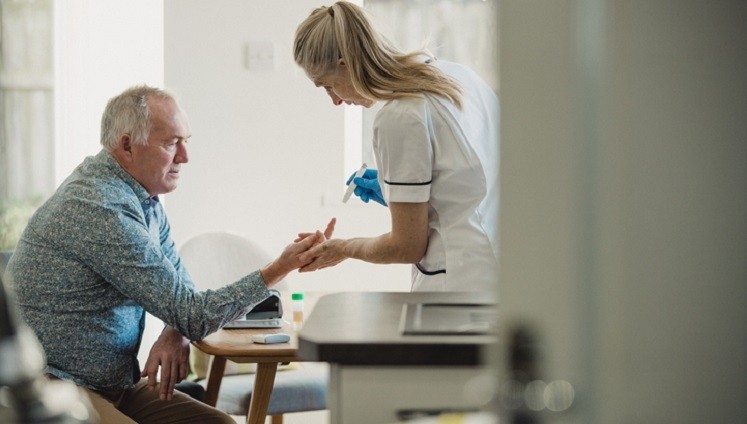Medable alliance promotes remote trial capabilities

Medable Inc., a provider of decentralized trial solutions, is joining forces with MRN, a company that focuses on home trial offerings globally. Together, the two companies plan to use Medable’s Trial Fit Telemedicine platform to enable trial teams to conduct remote patient monitoring, medication administration, patient care, clinical assessments, and other services.
Outsourcing-Pharma (OSP) spoke with Ching Tian (CT), senior vice president of strategy and solutions for Medable, about the partnership, and the important role decentralized trial solutions likely will play as the industry deals with patient-centricity and the impact of COVID-19.
OSP: Could you please tell us a little bit about Medable—what you do, who you are and services you provide?
CT: Medable is on a mission to reduce clinical trial timelines by 50%. The company has become an early leader in the movement to digitize and virtualize clinical trials. Over the past several years, Medable’s team has built a modular digital platform that streamlines design, recruitment, retention and data quality for decentralized trials. The platform is now used by dozens of leading biopharma sponsors and clinical research organizations worldwide, and has been used for trials in 30+ countries.
Medable has recruited a diverse and experienced team of digital and biopharma experts, with multiple offices globally including headquarters in Palo Alto, CA. Medable’s platform replaces previously siloed systems with integrated digital tools, data and interfaces to accelerate trial execution. The platform brings together patients, sites and clinical trial teams to improve patient access, experience, and outcomes.
OSP: How have attitudes toward and adoption of decentralized trials and technology been evolving since COVID-19 landed on us?
CT: Prior to the pandemic, decentralized trials were gaining momentum but still sometimes seen as risky or a “nice to have.” In most cases, decentralized capabilities have been incorporated into trials with one or two components, such as eCOA/eConsent — creating more of a hybrid trial. In the current environment, decentralized trials have become an absolute necessity, as many clinical sites are shut down or not seeing non-COVID-19 patients — and patients are locked in or don’t want to travel. All stakeholders can remain in contact through a decentralized approach including telemedicine, wearable devices and remote patient monitoring. Now, many more companies are designing fully decentralized trial protocols to offer a fully connected, direct-to-patient experience.
OSP: How have conversations about decentralized trials/tech changed since the pandemic started impacting the industry?
CT: Having worked on decentralized trials strategy as a sponsor for the prior two years, and now joining Medable in December 2019, the pandemic has definitely changed the perspective in a very short time.
Despite the general belief that decentralized trials and digital technology hold huge promise, and overall encouragement from FDA, the industry has been in the discovery phase and cautious to incorporate them into interventional studies, especially in ex-U.S. or global studies. Besides the massive effort needed to evaluate technology and services available, revamping well-established operational processes and the lack of regulatory guidance at country and regional levels is a major holdup. The pandemic literally changed the risk/benefit equation overnight. Sponsors are now looking for solutions that can be implemented as quickly as possible and are very open to new approaches.
Pharmaceutical companies are conducting thorough risk assessments on their protocol and dosing safely and many are accelerating deployment of decentralized technologies to their inflight studies to offer secure and compliant connectivity of sites staff to their remote patients. As we start to think about the longer term impact of the pandemic, many companies are prudently building in proactive decentralized options to their projected and yet-to-start protocols that allow flexibility and local choices for sites and patients. An important consideration in planning a decentralized protocol is to ensure the technologies provided are fully integrated to be frictionless to sites and patients, such that they are each able to access the technologies through one device and/or interface so all relevant study information and patient data is at their fingertips. Decentralized trial technologies should reduce administrative burden for the end users and offer integrated flow of data across the different ecosystem partners.
OSP: How did Medable and MRN come to work together? Is this something that has been in the works for a bit?
CT: Collaborating with service providers to operationalize decentralized trial models is part of Medable’s solution strategy. Our goal is to develop the best technology to enable decentralized trials for as many patients as possible globally. We understand some study procedures have to be performed in person by a trained healthcare professional. By partnering with MRN, a global home nursing service provider, we can achieve this goal faster and more effectively together.
OSP: Could you please describe how the partnership will work?
CT: Our vision of a partnership is to create more value for our customers than simply putting the existing capabilities from two companies together. We build streamlined processes beginning with the initial engagement step. Home nurses can be equipped with Medable’s technology to enhance interactions with principal investigators and patients, helping to ensure quality and improve efficiency. In addition, new service options can be developed to enhance the current offerings. For example, a PI can participate in an at-home patient visit supported by a home nurse through Medable’s Televisit feature. For PIs that are new to the home nursing service, or are concerned with losing the personal connection with patients, Televisit allows PIs to oversee a home nurse’s work and stay in touch with the patient.
OSP: Could you also tell me about Trial-Fit—how does it work, and what makes it stand out from similar telemedicine solutions?
CT: Trial-Fit Telemedicine is essentially an approach to align with the protocol and purpose of a clinical trial. Some other solutions only offer single use-case applications. By contrast, we are able to adapt the technology to fit researchers’ needs and patients’ experience. This enables a truly digital experience that works for everyone and fits with research design. For example, if you were to simply Skype or Zoom a televisit, that only meets one of many requirements for a remote trial. You also need to support the patient clinically and technically during the televisit, and integrate their medical devices for clinicians to read vital signs. Trial-Fit means nothing is lost when you make it digital.
OSP: Are there any concerns about possible increase in risk to the patient or provider? If so, how do your organizations address/mitigate such risks?
CT: Clinical trials — whether traditional or decentralized — should have the utmost concern for patient safety as well as data integrity to ensure successful research. Medable complies with clinical research regulations and surpasses all audits and certification required for quality research. Conducting trials remotely does not reduce the need for patient safety. It actually enables a more comprehensive view, allowing clinicians and researchers to have more continuous monitoring of patient safety and treatment response.
OSP: What else would you like to tell us about the Medable-MRN partnership that I haven’t asked about?
CT: We are in the very early stages of the decentralized clinical trial model. The Medable-MRN partnership is part of a broader ecosystem that Medable is building, so we can help accelerate the industry’s transition to this more patient-centric model.





















